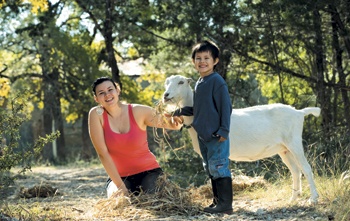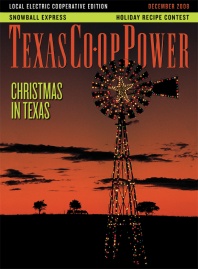As soon as Model the Alpine milk goat scrambles through the door, she eagerly bumps her head into a plastic bucket filled with mixed grains. Behind her on the concrete floor, Chrissy Omo—outfitted in black rubber boots, a tank top and jeans—squats on a low stool, wipes the goat’s bulging udder with disinfectant and attaches the milking machine.
“She walks just so, like she’s a model,” Omo says, explaining the goat’s name while she waits for the commercial milker to finish its job. Soon the machine’s steady chugging stops. Briskly, Omo detaches the apparatus and escorts the still-munching animal to an outside pen filled with a small herd of baaing goats. Within minutes, she returns with another impatient goat in a hurry to get to that bucket.
It takes at least three hours to get all the goats milked. About 9 a.m., Omo—with her black hair tucked beneath a brown netting—heads into the adjacent production room, where she sets to work again. Now it’s time to salt today’s batch of fresh chèvre, one of many specialty cheeses that Omo hand-makes and markets under her own label—CKC Farms. The farm is just east of Blanco.
This could be just another narrative about a hard-working Texas farmer. But what sets this one apart is Omo’s age: She’s only 20.
Oh, that age thing again. Omo shrugs. She’s used to folks making a fuss. But honestly, so what if she was just 16 when she bought her first milk goats and began making cheese in her mom’s kitchen at their home east of Blanco? “I just thought it was fun,” says the Pedernales Electric Cooperative member.
Fun, indeed. Try getting up every morning at 5:30 to milk 30 or so goats. By day’s end, they’ve got to be milked again. Add to that another 130 goats to feed and water twice daily. Not to mention making, packaging and delivering the cheese. All that takes lots of hours. No problem. Omo—with help from younger brothers Kenny, 12, and Conner, 4, along with parents Adriana and Daniel—handles the work and attends Texas State University in San Marcos.
The impetus behind CKC Farms—named for the three Omo siblings—sprang from a six-month stay in Europe in 2004. “My dad had a job over there, and we went, too,” Omo recalls. “We’d stop in restaurants and taste local meats, cheeses and breads. One day, I met a lady near the German border who had goats, and she gave me my first insight into cheese making.”
After the family’s return home, she and her mother went cheese hunting. “I kept looking for that same fresh flavor I’d tasted in Europe,” Omo says.
Their search proved futile. So Omo came up with an idea: Why not buy a few milk goats and make their own cheese? Sure, said her parents, but first find out what such an endeavor might involve. Encouraged, Omo read books, researched the Internet and snagged some farm chores at Pure Luck Farm and Dairy, a goat dairy a few miles west of Dripping Springs. Undaunted by the hard work, Omo sat back down with her parents and outlined a plan. In January 2005, she bought 10 Alpine goats. By fall, she was taking cheese plates to her teachers at Blanco High School.
That’s not to say her cheese-making expertise came effortlessly.
“I must have made five or six batches at first, and they all turned out like cream cheese,” Omo laughs. “So we made cheesecakes. We were giving them away to everyone. It took a lot of trial and error before I developed my own processes.”
From there, Omo became proficient at turning out fresh chèvre, a basic goat milk cheese that’s soft, creamy and mild in taste. To add variety, she rolled some cheese rounds in fresh herbs and others in edible charcoal, a French-style cheese with a firmer texture that she dubbed “Midnight.” From there, she branched out to feta and baby caprino.
Samples given to teachers and friends led to orders for her cheese. Her facility cleared inspections by the Texas Department of State Health Services, which allowed local markets to sell CKC Farms products.
Bolstered by growing demand for her goat cheese, Omo designed a 1,500-square-foot production facility that went online before she graduated from high school in May 2006. Her “shop”—a metal building a short walk from the Omos’ home—includes a cheese-making room, walk-in cooler, milking area and tasting room.
As the business has grown, so has the CKC Farms product line. It includes Baby Blue (an Italian-style blue cheese), an aged caprino Romano, a jalapeño and artichoke spread and her best seller—seasoned feta, chunks of delicate feta marinated in extra-virgin olive oil, rosemary, sun-dried tomatoes and roasted garlic. “I produce at least 100 pounds of cheese a week,” says Omo, whose retail business does not handle mail orders.
These days, the busy young woman divides time among her goats, cheese-making, family, dating (she’s smitten with a young chef from Wichita Falls) and college. By 2011, she plans to finish her bachelor’s degree in international business and food nutrition. “I go part time in the spring and full time in the fall because we don’t milk as heavily then,” she says.
“I don’t know where it’s going,” Omo adds. “Life’s just going to have to unfold. There are a lot of factors to think about, but with the business courses I’m taking, I’ll be able to figure things out.”
No doubt, she will.
——————–
Sheryl Smith-Rodgers is a frequent contributor to Texas Co-op Power.


